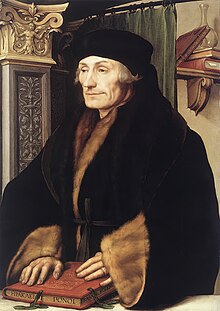
Back Desiderius Erasmus Afrikaans Erasmus von Rotterdam ALS Erasmo de Rotterdam AN إيراسموس Arabic ايراسموس ARZ Erasmu de Rotterdam AST Desiderius Erasmus Aymara Rotterdamlı Erazm Azerbaijani Эразм Ратэрдамскі Byelorussian Эразм Ратэрдамскі BE-X-OLD
Desiderius Erasmus Roterodamus (/ˌdɛzɪˈdɪəriəs ɪˈræzməs/; Dutch: [ˌdeːziˈdeːriʏs eˈrɑsmʏs]; English: Erasmus of Rotterdam or Erasmus; 28 October c.1466 – 12 July 1536) was a Dutch Christian humanist, Catholic theologian, educationalist, satirist, and philosopher. Through his vast number of translations, books, essays, prayers and letters, he is considered one of the most influential thinkers of the Northern Renaissance and one of the major figures of Dutch and Western culture.[2][3]
He was an important figure in classical scholarship who wrote in a spontaneous, copious and natural Latin style. As a Catholic priest developing humanist techniques for working on texts, he prepared important new Latin and Greek editions of the New Testament, which raised questions that would be influential in the Reformation and Counter-Reformation. He also wrote On Free Will, The Praise of Folly, Handbook of a Christian Knight, On Civility in Children, Copia: Foundations of the Abundant Style and many other works.
Erasmus lived against the backdrop of the growing European religious Reformation. He developed a biblical humanistic theology in which he advocated tolerance, concord and free thinking on matters of indifference. He remained a member of the Catholic Church all his life, remaining committed to reforming the Church from within. He promoted the traditional doctrine of synergism, which some prominent Reformers such as Martin Luther and John Calvin rejected in favor of the doctrine of monergism. His middle-road approach disappointed, and even angered, partisans in both camps.
- ^ Bacchi, Elisa (2019). "Hercules, silenus and the fly: Lucian's rhetorical paradoxes in Erasmus' ethics". Philosophical Readings. 11 (2): 120–130. doi:10.5281/zenodo.2554134. ISSN 2036-4989.
- ^ Tracy, James D. "Desiderius Erasmus Biography & Facts". Encyclopædia Britannica. Retrieved 29 May 2018.
- ^ Sauer, J. (1909). Desiderius Erasmus Archived 13 June 2010 at the Wayback Machine. In The Catholic Encyclopedia. New York: Robert Appleton Company. Retrieved 10 August 2019 from New Advent: http://www.newadvent.org/cathen/05510b.htm
© MMXXIII Rich X Search. We shall prevail. All rights reserved. Rich X Search
